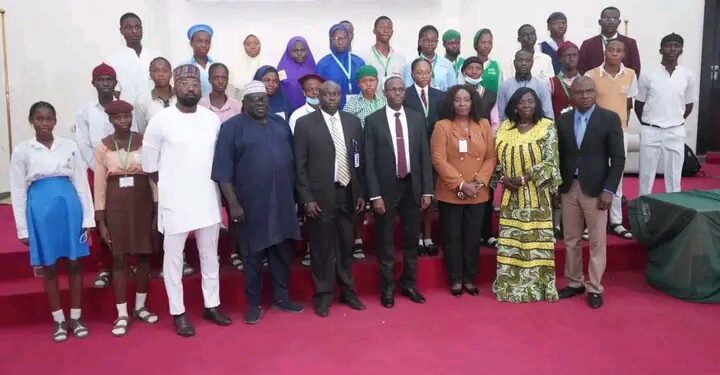The Chairman Independent and Corrupt Practices and other related offences Commission (ICPC), Dr Musa Aliyu (SAN), says youths are agents of change the nation desperately needs in the fight against corruption.
Aliyu said this on Tuesday in Abuja at the inauguration of 30 Students Anti-Corruption Clubs (SACs) from public and private secondary schools in the Federal Capital Territory.
The chairman, who called on the youth to be the vanguard against corruption, stressed the need for collective commitment to combating corruption from its very roots, starting with the students.
“The youth of Nigeria hold a unique position in society – you witness firsthand the various corrupt practices occurring within our schools.
“From teachers demanding bribes or sexual gratification for higher grades to the embezzlement of school funds, as well as absenteeism from classes.
“These acts of corruption erode the foundation of our educational system. You have a role to play to stop corruption so that you are not merely observers or victims.
“You can act as whistle blowers, reporting instances of corruption to relevant authorities and to ICPC,” he said.
According to him, by speaking out the wrong doings, they will become catalysts for change, accountability and transparency in the school system.
“You are the agents of change we desperately need in our fight against corruption. Your voices, your actions and your determination can transform Nigerian schools into beacons of integrity, innovation, and excellence,” he added.
The ICPC chairman said that the establishment of the students anti-corruption clubs was to signify the need for collective action in combating corruption from the roots, starting with the future leaders.
“The few of you here are the leaders of the clubs in your schools and as leaders, it is imperative that you lead by example.
“You must strive to cultivate ethical and moral values, rejecting the allure of corruption,” he said.
Aliyu explained that the purpose of the anti-corruption clubs was to combat the insidious plague of corruption as individuals and community.
He expressed concern that corruption had eaten very deep into the very fabrics of the nation, and has become impossible to ignore.
“We must acknowledge the fact that Nigerian schools are not immune to the stain of corruption.
“It has infiltrated our classrooms, marred our examinations, and tarnished the reputation of our educational system.
“The present fake certificate scandal rocking institutions is evidence of how bad the rot has eaten deep into our system,” Aliyu added.
The chairman, therefore, said that the fight against corruption was a collective responsibility which must be shared by all.
Aliyu said that the clubs were meant to serve as platforms for the students to learn about the causes and consequences of corruption, engage in discussions and debates, and develop innovative strategies to combat the menace.
“The clubs are a part of our efforts at entrenching positive behavioral change in schools; through the clubs, we empower our students to be agents of change, to challenge the status quo and demand accountability from those in authority,” he said.
A Deputy Director, FCT Department of Science and Technology and Innovation, Mrs Yacim Bako, said that the fight against corruption was a battle that must be won.
“If you are corrupted, you have devalued yourself, hence you need to stay in the path of honour. You can achieve great success without being corrupt,” she said.
The Head of Clubs and Society, FCT Secondary Education Board, Mr Itam Nneoyi, appreciated the partnership with the ICPC to instill anti-corruption values in the students.
Nneoyi said that the partnership was already yielding results as some students were already distinguishing themselves in carrying out anticorruption activities in theirs schools.
Also, Mr Okor Odey, the Deputy Director, Education Division, Public Enlightenment and Education Department, ICPC, urged the students to stay away from all forms of corrupt practices.
Odey in a presentation titled, “The place in ICPC of Youths in the fight against Corruption in Nigeria,” said corruption include all forms of anomalies, such as truancy, examination malpractice, lateness to school, bullying, jumping fence, and laziness among others.
“To be a member of anti-corruption club, you must not cheat, not join a bad group, must study to pass in flying colours, and you should be a good example to others,” he said.
Speaking earlier, the Acting Director, Public Enlightenment and Education Department of ICPC, Mrs Azuka Ogugua, said that the establishment of the clubs was part of the commission’s efforts to fight corruption from the grassroots.
Ogugua said that the clubs would serve as platforms for students to learn about the causes and consequences of corruption (NAN)











